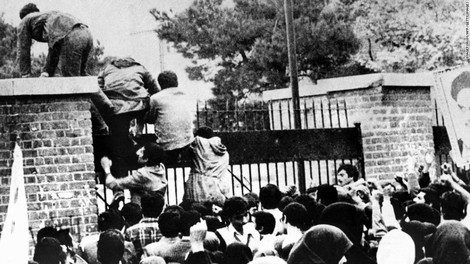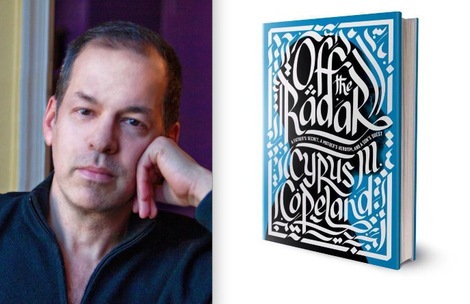Today is the 36th anniversary of the US Embassy takeover by Iranian revolutionaries. That fateful day gave rise to the ensuing "Hostage Crisis", which lasted 444 days - and started less than two weeks after the Shah of Iran had been admitted to the US for Cancer treatment by then President, Jimmy Carter.
I remember the election of Carter versus Ford. Not because I was a voting American, but because I was an Iranian child in an American school in Tehran, in 1976. Over the PA system, almost 3 years to the day before relations would unhinge for 30 years to come, we got up to the minute reports of election developments until the results were gleefully pronounced over the school wide speakers. Jimmy Carter was in fact, the new President of the United States.
Few Iran-watchers seemed to know then that robust discontent was already brewing in an underground movement well under way to undermine the Shah, and install a militant form of Islam led by a brutal cleric. Little did most Iranians know that the secular order they so enjoyed, unencumbered by Hijab for women, a ban on music for all or the harsh segregation of genders, was so close at hand. Little did women know that their hard won rights for civic equality were so deeply threatened. Nor did anyone foresee that the thousands of US citizens who were being received so warmly across the country, would soon be evacuated or taken hostage.
A fundamental change was so close at hand, but so hardly detected.
36 years later, one of the most beautiful tales of that volatile time in the history of so many Iranian families comes to life in a book by an Iranian-American, Cyrus Copeland.
Copeland is a notorious name in Islamic Iran. Miles Copeland would go down in Iranian history, as its told by the Islamic regime for local consumption, as the architect of the 1953 Coup that took down Mohammad Mossadegh, and re-installed the Pahlavi Dynasty. The coup was famously, now admittedly, masterminded by the CIA. Of course Miles has no relation to Cyrus, whose father Max, was coincidentally involved with the CIA in Iran, in 1979.
The tale that unfolds in Off The Radar -- the gripping history of a family treading two perilous worlds that have violently collided on their watch -- chronicles the life of Max through the eyes of his son, Cyrus, whose mother is an Iranian lioness not unfamiliar to those of us who know the formidable strength of an Iranian woman with a mission.
I fell in love with Max, the introverted thinker with great expectations of life. I also came away admiring the heroine, a mother and wife, who used every ounce of strength and grace she had to save her family, at times biting her dignity to get out of a hostile Iran, intact.
Through this tale that reads like a movie, my mind found its way into old memories of my own bi-national family, sometimes lingering in dark corners of rooms where hushed conversations among adults gave the kids an inkling as to how bad things really were. Through incredible writing, Cyrus had me thinking, remembering, imagining and reliving the angst of the time, while sitting at the edge of my seat or sighing in relief, as he told the cryptic tale of his life with a man who may or may not have been a CIA spy in Iran. Cloaked in a modern historic mystery, a family now caught in a web of complexity while navigating revolutionary Iran and all its hectic confusion, seemed to be trying to save itself out of a sinking ship. Instead of lifeboats, there were threads -- leading to no place less impressive than the highest offices in Washington DC, or the harried headquarters of Ghotbzadeh's revolutionary corps, where American hostages could be heard overhead. But then, the threads run loose, with no answers to satiate the curiosity of the son, or quite frankly, the reader, who is increasingly vested in the outcome of this tale.
Back in America, 36 years later, Cyrus and I look-on eagerly, like we did then as kids, at a new US-American order. Now with the historic "Iran Deal" rancorously inked into law, we search for clues as to how things will unfold. The Iranian in me wants a glimmer of days passed when the US and Iran were adoring allies and the straddling of these two worlds was as easy as a hastily purchased air ticket. No Visas. No airport pat downs. No switching of the Passport mid-way. The American in me wants to see the openness of my US life, and my codified rights as a woman, my autonomy as a human and my right to self determination be replicated in a closed, cryptic, judicially volatile Iran.
Most people are crowding along the sidelines just as we are, waiting to see how the deal opens pathways for an exchange. The exchange of business, ideas, visitors, cultures -- everything that has been held at bay for 36 years since the first hostage was paraded, blind folded, through the streets of Tehran, humiliating the mighty US for the world to see -- that is poised to step back in.
36 years to the day, it may just be that bygones are finally going to be released in the water that flows under the Khaju Bridge, and families can piece together their dual legacy, to become whole again. With reservations abounding and an inherent distrust for a political order rooted in religion, I look on with anticipation of what the next chapter of this dual history of nations holds.
This post is dedicated to my Cousin, Douglas Zargham, whose birthday was yesterday.



